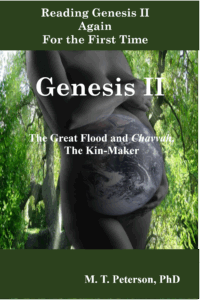What if the story of Eden wasn’t a fall from paradise, but the beginning of something far more human?
In Genesis II: Reading the Book Again for the First Time, M.T. Peterson, PhD, brings fresh eyes to one of the Bible’s most familiar stories—challenging centuries of inherited theology and re-centering the narrative on free will, moral agency, and the making of kinship. With sharp linguistic analysis and literary sensitivity, Peterson demonstrates that Genesis 2–4 is not a creation account at all, but a theological prologue to the Great Flood—a justification for divine judgment not based in caprice, but in the tragic unraveling of humanity’s capacity for altruism.
At the heart of the story is Chavvah (Eve)—not simply the mother of all living, but the first kin-maker, whose role in civilization has been obscured by mistranslation and misinterpretation. Drawing on the insights of scholars such as Ziony Zevit and Marc Zvi Brettler, Peterson reinterprets key verses—especially Genesis 4:1 and 3:16—to uncover how sexuality, not sin, drives the story forward, and how following natural human impulses may be incompatible with moral development.
Readers will explore:
- Why Genesis 2–4 is best read as the narrative prelude to the Flood, not a standalone creation story.
- Why the primordial couple were not executed after eating the fruit from the Tree of Knowledge.
- How mistranslating Genesis 3:16 distorted the institution of marriage for generations.
- The yetzer hara and yetzer hatov as literary metaphors for human desire and responsibility.
- A fresh translation of Genesis 4:7 that radically redefines sin—not as a crouching demon, but as unmanaged emotional impulse.
- Why Eden was never a utopia, but a place of labor, limitation, and divine intimacy.
Scholarly yet readable, provocative yet grounded in the nuance of Biblical Hebrew, Genesis II is ideal for readers of John H. Walton, Ellen Davis, Avivah Zornberg, Ziony Zevit, Genesis II stands out as a new, but deeply biblical narrative not of punishment but of the source of human flourishing that, in the absence of God’s word, is forever tenative.

